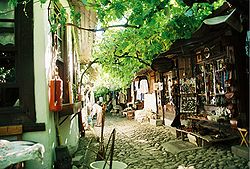Safranbolu
| City of Safranbolu | |
|---|---|
| Name as inscribed on the World Heritage List | |
 |
|
| Location | Turkey |
| Type | Cultural |
| Criteria | ii, iv, v |
| Reference | 614 |
| UNESCO region | Europe and North America |
| Inscription history | |
| Inscription | 1994 (18th Session) |
| Safranbolu | |
|---|---|
| District | |

A street at the historical market of shoemakers in Safranbolu
|
|
 Location of Safranbolu within Turkey. |
|
| Location of Safranbolu | |
| Coordinates: 41°15′N 32°41′E / 41.250°N 32.683°E | |
| Country |
|
| Region | Black Sea |
| Province | Karabük |
| Government | |
| • Mayor | Necdet Aksoy (AKP) |
| Area | |
| • District | 999.99 km2 (386.10 sq mi) |
| Elevation | 485 m (1,591 ft) |
| Population (2012) | |
| • Urban | 43,060 |
| • District | 55,170 |
| • District density | 55/km2 (140/sq mi) |
| Time zone | EET (UTC+2) |
| • Summer (DST) | EEST (UTC+3) |
| Postal code | 78xxx |
| Area code(s) | 370 |
| Licence plate | 78 |
| Climate | Cfa |
| Website | www.safranbolu.bel.tr |
Safranbolu (Greek: Σαφράμπολις, Saframpolis) is a town and district of Karabük Province in the Black Sea region of Turkey. It is about 9 km north of the city of Karabük, 200 kilometres (120 mi) north of Ankara and about 100 km south of the Black Sea coast. The town's historic names in Greek were Theodoroupolis (Θεοδωρούπολις, i.e. city of Theodorus or female Theodora) and later Saframpolis (Σαφράμπολις). Its former names in Turkish were Zalifre and Taraklıborlu. It was part of Kastamonu Province until 1923 and Zonguldak Province between 1923 and 1995.
According to the 2000 census, the population of the district was 47,257, of which 31,697 lived in the town of Safranbolu. The district covers an area of 1,000 km2 (386 sq mi), and the town lies at an elevation of 485 m (1,591 ft).
The Old Town preserves many historic buildings, with 1008 registered historical artifacts. These are: 1 private museum, 25 mosques, 5 tombs, 8 historical fountains, 5 Turkish baths, 3 caravanserais, 1 historical clock tower, 1 sundial and hundreds of houses and mansions. Also, there are mounds of ancient settlements, rock tombs and historical bridges. The Old Town is situated in a deep ravine in a fairly dry area in the rain shadow of the mountains. The New Town can be found on the plateau about two kilometers west of the Old Town.
The name of the town derives from "saffron" and the Greek word polis (πόλις) meaning "city", since Safranbolu was a trading place and a center for growing saffron. Today, saffron is still grown at the village of Davutobası to the east of Safranbolu, with a road distance of 22 kilometres.
Safranbolu was added to the list of UNESCO World Heritage sites in 1994 due to its well-preserved Ottoman era houses and architecture.
...
Wikipedia

